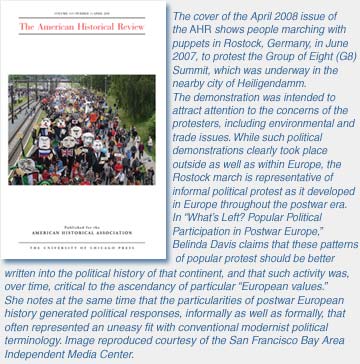 Members should be receiving their April 2008 issue of the American Historical Review very soon. The issue contains two articles, a review essay, an AHR Forum, six featured reviews, and our extensive book review section.
Members should be receiving their April 2008 issue of the American Historical Review very soon. The issue contains two articles, a review essay, an AHR Forum, six featured reviews, and our extensive book review section.
The two articles continue with our recent emphasis on transnational and imperial history. Jeremy Adelman's "The Age of Imperial Revolutions" explores the relationship between the crises of empires and the making of nations during the age of revolutions in the late 18th and early 19th centuries. He argues, among other things, that the historical processes of emerging nations and supposedly waning empires were less antithetical than we have heretofore supposed. "Reforestation, Landscape Conservation, and the Anxieties of Empire in French Colonial Algeria," by Caroline Ford, adds an ecological element to this subject by demonstrating how competition over forests and land use was at the heart of relationships between colonialists and the indigenous population in French Algeria. Her article provides evidence that French policies toward the environment reflected pervasive anxieties about climate, race, and the relationship between "East" and "West" in this North African colonial context. Belinda Davis's review essay, "What's Left? Popular Political Participation in Postwar Europe," surveys the historiography of popular politics in postwar Europe. In particular, her reading of this literature reveals the importance of new forms of political involvement and participation. Finally, the AHR Forum focuses on Geoff Eley's A Crooked Line: From Cultural History to the History of Society (2005), a book that offers both an analysis of the various transformations of historical thinking in the last 40 years and a personal narrative of how one historian experienced them. Three historians with different perspectives and expertise, William Sewell, Gabrielle M. Spiegel, and Manu Goswami, provide assessments of Eley's account. Eley closes the forum with a rejoinder to these essays and additional reflections that expand upon and modify the themes of his book. It is hoped that this forum will stimulate further discussion on the past and future of the practice of history.
Members should realize that the AHR always welcomes submissions or ideas for submissions. Indeed, very few of the articles we publish originate as commissioned or solicited pieces. While it is true that our rigorous review process means that only a fraction of those we receive ultimately find a place in our pages, this same process means that even rejected submissions can benefit from as many as six readers' reports. Thus, for an 8,000-word article, one might receive considerably more feedback than one could expect from a university press for an 80,000-word monograph. So send us your best stuff! Guidelines for submissions can be found online.
—Robert A. Schneider is the editor of the American Historical Review. He can be reached at raschnei@indiana.edu.
Tags: AHA Activities Scholarly Communication
Comment
Please read our commenting and letters policy before submitting.






